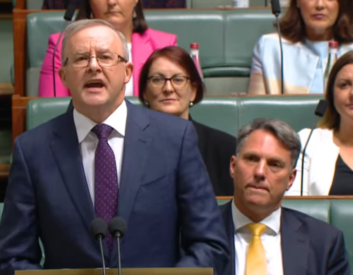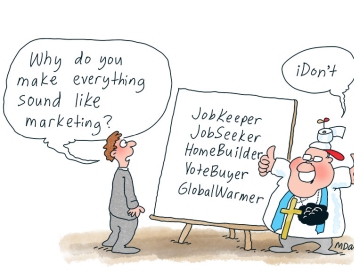The ALP has a new challenge in from of it with Malcolm Turnbull now heading the Liberal Party, however a bigger challenge is represented by new UK Labour leader Jeremy Corbyn, writes Dr Geoff Davies.
No doubt the apparatchiks of the Australian Labor Party are currently very exercised with how to counter the Turnbull Coalition Government.
It is now possible to conceive that Malcolm Turnbull could comfortably win the next Federal election. Or perhaps the Coalition will tear itself apart and Labor will coast in. In these early days, no-one knows.
But the ALP would do well to focus also on a more profound challenge, one that may turn out to be existential. The personification of this challenge is Jeremy Corbyn, who recently won a landslide victory in a ballot of members and supporters for the leadership of the UK Labour Party.
The UK political class has declared Corbyn to be unelectable in a general election, but then none of them thought he stood a chance of winning the Labour leadership, so what would they know? Corbyn tapped into a vein of discontent with politics as usual and whether he can beat the Tories will depend on how deep that vein runs. At this stage, no-one knows for sure.
However signs have been building for some time that the vein of discontent runs very deep, here and abroad. Corbyn, and others like him, could win.
The discontent is grounded in people’s personal experience, but backed also by clear evidence and sound ideas. People, societies and their markets are far more complex and subtle than portrayed by simplistic neoliberal slogans and economic theories. In fact, the grand neoliberal experiment in social engineering, begun around 1980, and based on individualism and free markets, has failed.
After three decades of cost-cutting, deregulation and privatisation, Australia has slower growth, greater inequality, ugly social division, degrading infrastructure and sadly diminished cultural institutions. The problem with extreme inequality is not envy, it is that the very rich expect to run the world to suit themselves. Democracy is yielding to plutocracy.
Employment insecurity and work hours have increased, and family and community time have suffered. Our health is starting to suffer. Unemployment and under-employment are high and home ownership is more and more out of reach.
We used to be able to afford education and health care that were accessible to everyone, decent minimum wages for all and help for the struggling. We afforded a vigorous and independent ABC, and supported for arts and culture of many types. Why are we told we can no longer afford these things, now that we are rich?
♨☛TREASURER #MORRISON's SHAKY START! Get it through your head, Scott, ITs A REVENUE & A SPENDING PROBLEM!⇨http://t.co/M8mUJIigug #auspol
— Editor (@SMNaustralia) September 29, 2015
In other parts of the world, the details are different, but the discontent is also rising. South American countries are breaking away from the “Washington Consensus” that yielded debt-bondage, instability and collapse. There are rising movements in the periphery of Europe against the austere tyranny of the European Central Bank, notably in Greece and Spain. Scotland rebelled against London’s austerity and set the stage for Corbyn’s rise. Democrat presidential aspirant Bernie Sanders is tapping the vein in the US.
Behind these symptoms is a much-obfuscated record of economic mediocrity and instability. Globally, GDP growth for over 100 nations averaged 2.47% 1960-1980, but only 1.1% 1980-2005 according to the U.S. Center for Economic Policy Research.
In Australia during the 1950s and 1960s, GDP growth averaged a spectacular 5.2%, inflation averaged a moderate 3.3%, and unemployment was stunningly low at 1.3%. The post-1980 neoliberal era has never come close to that performance.
But the worst part of the neoliberal record is debt-fuelled instability: recessions, financial crashes, even political collapse in Argentina. In 2007-8 these culminated in the Global Financial Crisis, triggering the Great Recession that lingers still in the US and Europe, reaching severe depression levels in Greece and Spain.
Even in lucky, sunny Oz, people know they are scrambling on an accelerating treadmill, know they have less time for family and community, know their kids can’t afford housing, know the great promise of the post-war decades has peaked and seems now to be receding. Farmers are discovering they can be sacrificed to mining, the grocery duopoly and foreign ownership. Home owners wonder when someone will get serious about the clean energy revolution that is building rapidly in spite of all the obstacles thrown up by both the ALP and the Coalition.
The ideas underpinning neoliberalism are as deficient as its record. We are not isolated, autonomous, calculating individuals, we are intensely social beings. Language, and the vast accumulation of human culture it has enabled, can only have arisen and persisted in the context of a close, sharing social group. Life involves cooperation just as pervasively competition. Look at your own family, your community, our society. To pretend otherwise is to impose an alien vision just as dehumanising as the communist homogenised utopia.
Free market ideology: Resist the rise of the evil psychopathic morons https://t.co/PmEWjn0Uax @IndependentAus
— ricky (@raja888) July 13, 2015
The richness of a healthy, fulfilling life derives from the balancing of the interests of the individual and the group, as the Taoists figured out long ago.
The theory behind free-market economics is laughably irrelevant. It presumes equilibrium when all around us is change and instability. Astonishingly, it excludes money and debt, which is why it missed the build-up of mortgage debt whose collapse triggered the GFC. Markets are powerful, money is powerful, debt is destabilising and all of them need careful management if they are to be of benefit. Laissez faire is just anarchy by another name, a license for bullies and warlords.
The ALP has been complicit all the way in the neoliberal project. Paul Keating set the pattern for the parties that were supposed to look after the average punter, and was copied by Tony Blair and Bill Clinton.
By now they don’t know what else to do, except to be Tory-lite. Ed Miliband tried taking UK Labour slightly to the left and got trounced, so they think they can only return to being “centrist” (which these days is far to the right of, for example, Bob Menzies). But that is how they got into this mess — forever on the defensive, wedged ever-further right.
In response to the difficulties of the 1970s, the ALP turned sharply right. Their new path led them into a narrow valley that is increasingly rocky and arid, hemmed in by rugged ridges.
However, beyond the ridge to the left lie the broad and fertile plains of their home territory. Had they persisted on their original path through the difficulties of the 1970s, which were transient and of mainly extraneous origin, they would long since have regained that ground, and prospered on their own terms.
Corbyn’s intention is to drag UK Labour all the way back to what used to be called social democracy — the moderate left of old, suitably updated. The gamble of scaling the intervening rocky barrier is what so alarms the myopic, timid souls of the British and Australian labour elites.
But how is Australia served by having two conservative parties? The ALP needs to listen to the average punters who have long since felt betrayed and abandoned. The UK membership has spoken and propelled Corbyn to the top. Whether he can succeed will depend on the willingness of the old elite to go along on the adventure.
Unfortunately, there is little sign the ALP elite will loosen their tight control of the party machine. If they do not, they may find they are rapidly squeezed out of relevance by independents and minor parties, including the canny Nick Xenophon.
My hope is that the ALP will expand its view and change. However, my expectation is that well within a decade the world will have changed dramatically and an ossified ALP will be a spent force.
Dr Geoff Davies is an author, commentator and scientist. He blogs at BetterNature (betternature.wordpress.com). He is also the author of Sack the Economists (Nov 2013, sacktheeconomists.com).
The John Graham art featured in this piece may be purchased from the IA store.

This work is licensed under a Creative Commons Attribution-NonCommercial-NoDerivs 3.0 Australia License
Monthly Donation
Single Donation
From Jeremy Corbyn: debate, disagree, challenge, but don't abuse. #anewkindofpolitics pic.twitter.com/ePB7IgA86H
— JeremyCorbyn4PM (@JeremyCorbyn4PM) October 3, 2015
A new way. Subscribe to IA for just $5.









